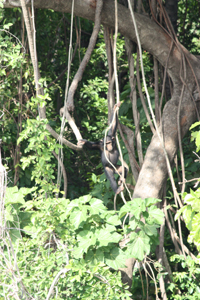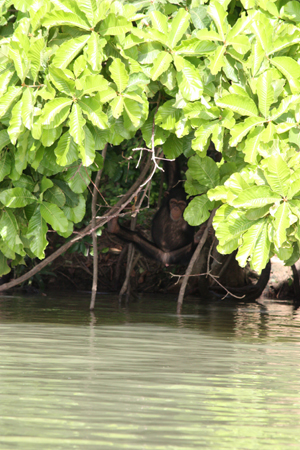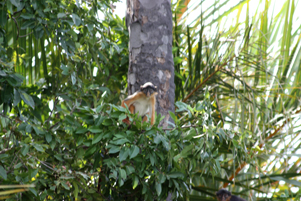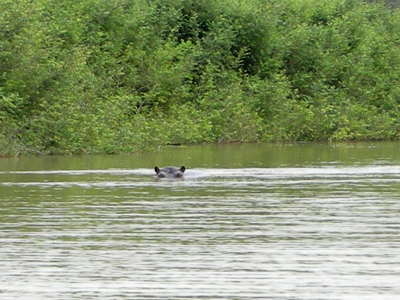![]()
River Gambia National Park
![]()
 The
River Gambia National Park (also known as Baboon Island) is a complex
of five islands (total area 585ha) and was gazetted in 1978. All islands
are quite flat and possess mainly gallery forest with some open swampy
or savannah areas. The park is situated in Central River Division
(CRD) about 300km by road from Banjul. It forms one of the last refuges
for the very threatened hippotamus within The Gambia. Since 1979 a
Chimpanzee Rehabilitation Project (CRP) has been conducted on the
islands, and there are currently about fifty chimpanzees living on
3 of the larger islands. The population is steadily increasing through
births. In addition to reintroducing an indigenous species to the
country, the existence of the project in the River Gambia National
Park has assisted in protecting the forest and its resources from
over-exploitation. The Department of Parks & Wildlife Management
and the CRP work hand in hand for the protection of the park and its
environs.
The
River Gambia National Park (also known as Baboon Island) is a complex
of five islands (total area 585ha) and was gazetted in 1978. All islands
are quite flat and possess mainly gallery forest with some open swampy
or savannah areas. The park is situated in Central River Division
(CRD) about 300km by road from Banjul. It forms one of the last refuges
for the very threatened hippotamus within The Gambia. Since 1979 a
Chimpanzee Rehabilitation Project (CRP) has been conducted on the
islands, and there are currently about fifty chimpanzees living on
3 of the larger islands. The population is steadily increasing through
births. In addition to reintroducing an indigenous species to the
country, the existence of the project in the River Gambia National
Park has assisted in protecting the forest and its resources from
over-exploitation. The Department of Parks & Wildlife Management
and the CRP work hand in hand for the protection of the park and its
environs.
The Chimpanzee Rehabilitation Project
 Background:
The chimpanzee (Pan Troglodytes) is already extinct in much of
its former range and endangered in the remaining countries it inhabits.
The species disappeared from the Gambia in the early 1900’s.
The CRP is a private organisation which provides a natural life for
chimpanzees caught during illegal trading and confiscated by government
authorities. Rehabilitation is a long term process requiring much
time and care for the orphans to recover, both emotionally and physically
from capture. During this period the orphaned animals learn or improve
survival skills, including foraging for food, building nests and responding
approximately to hazardous animals or predators. Their adaptation
is closely studied both before and after release into the natural
habitat. There are presently about 50 chimpanzees living free on three
islands in four social groups. 29 were released on the island and
to date 21 have been born there.
Background:
The chimpanzee (Pan Troglodytes) is already extinct in much of
its former range and endangered in the remaining countries it inhabits.
The species disappeared from the Gambia in the early 1900’s.
The CRP is a private organisation which provides a natural life for
chimpanzees caught during illegal trading and confiscated by government
authorities. Rehabilitation is a long term process requiring much
time and care for the orphans to recover, both emotionally and physically
from capture. During this period the orphaned animals learn or improve
survival skills, including foraging for food, building nests and responding
approximately to hazardous animals or predators. Their adaptation
is closely studied both before and after release into the natural
habitat. There are presently about 50 chimpanzees living free on three
islands in four social groups. 29 were released on the island and
to date 21 have been born there.
 Education
: The CRP has successfully created a community of chimpanzees
comparable in size and behaviour to existing wild populations. As
such, the project is currently faced with same problems of protection
as other organisations attempting to preserve wild chimpanzee groups.
To this end, the CRP operates an education programme. Slide shows
emphasising the similarities between humans and chimps and the threats
to their constant survival are presented in villages and schools surrounding
the national park. The goals of the programme are to create an awareness
and sympathy for the acute vulnerability this species is now experiencing
as well as encourage general environmental awareness.
Education
: The CRP has successfully created a community of chimpanzees
comparable in size and behaviour to existing wild populations. As
such, the project is currently faced with same problems of protection
as other organisations attempting to preserve wild chimpanzee groups.
To this end, the CRP operates an education programme. Slide shows
emphasising the similarities between humans and chimps and the threats
to their constant survival are presented in villages and schools surrounding
the national park. The goals of the programme are to create an awareness
and sympathy for the acute vulnerability this species is now experiencing
as well as encourage general environmental awareness.
Visitors : As the RGNP is considered a research area it is closed to tourists. Permission for official visitors must be obtained from the Director of Parks & Wildlife Management. Many people request permission to see the chimpanzees on the Baboon Islands. Unfortunately it is not possible to accommodate these requests for several reasons. The goal of the project is to care for, protect and create self-sufficient independent chimpanzees. This can be undermined by contact with humans as well as exposing to a variety of illnesses for which they have no immunity.
Fauna & Avi-Fauna

The most abundant mammals are common warthogs. Primates are represented by the Guinea Baboon, Callithrix Monkey, Western Red Colobus - the Guinea Baboon is by far the most plentiful. Among the other species that are known to occur are the Aardvark, the Ratel, Serval, Genets, African Clawless Otter and West African Manatee, the Nile Crocodile and Hippopotamus. Antelope Species identified include Bushbuck, Maxwell’s and Bush Duikers.

Reptiles are plentiful, snakes and lizards being fairly frequently encountered. The avi-fauna of RGNP is very rich and varied. Egrets, Herons and Ibis’s are particularly well represented. one satellite islet of just a few acres provides a nesting site for many thousands of breeding Egrets, Herons, Cormorants, Sacred Ibis, Weavers and Doves which all nest in close proximity to each other.
Visit the project site and adopt a chimp! HERE
![]() Home-
Back to start page
Home-
Back to start page
![]()
E-mail mcamara @post3.tele.dk
Last updated on January 5th, 2019
![]()
[Me] [Africa][Culture]
[Links]
[Guest book][The
Stone circles][Serrekunda]
The information on this page was provided by Department of Parks & Wildlife Management, The Gambia. For further information on visiting the protected areas of The Gambia contact the Ecotourism & Training Unit, PO Box 2164, Serrekunda, email wildlife@gamtel.gm